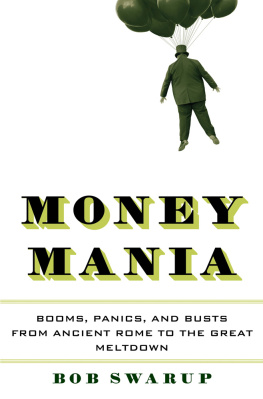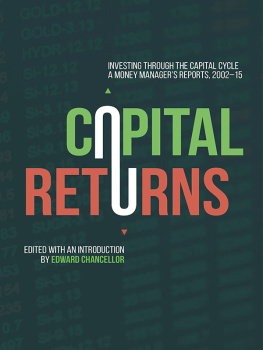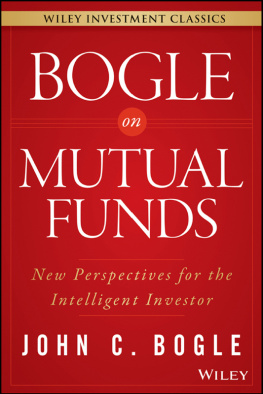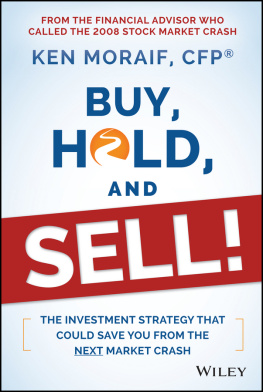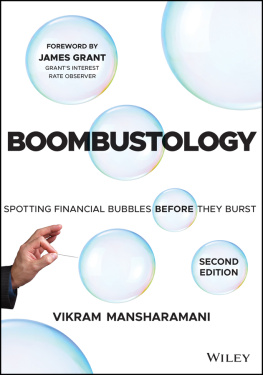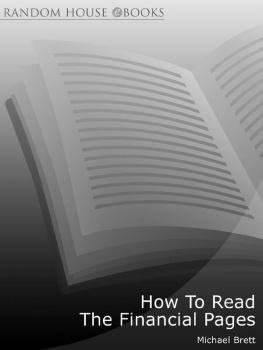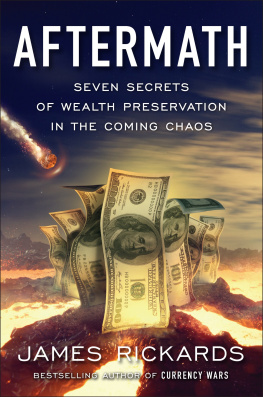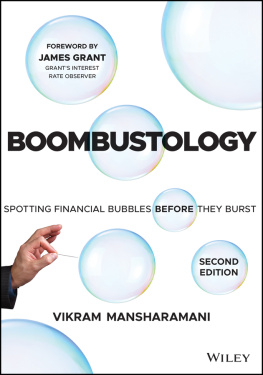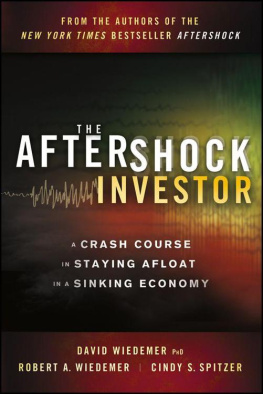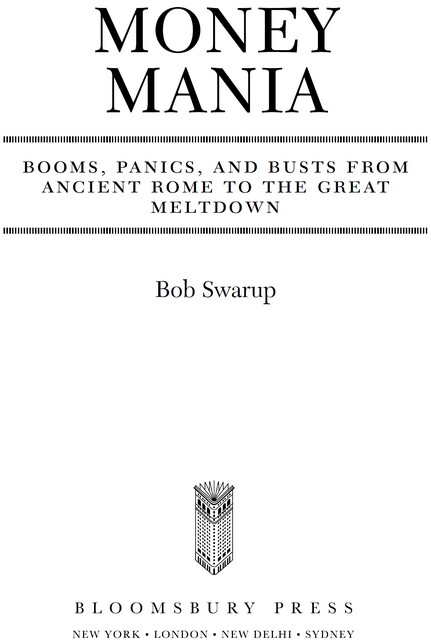
To Radhika for her love, for her endurance, and for her refusal to deliver our first until I had delivered the kernel of this book.
Contents
Dj Vu All Over Again
Of Men, Money, and Mania
When experience is not retained, as among savages, infancy is perpetual. Those who cannot remember the past are condemned to repeat it.
George Santayana (18631952)
Recurrent speculative insanity and the associated financial deprivation and large devastation are, I am persuaded, inherent in the system.
J. K. Galbraith (19082006)
Take a deep breath.
Feel the air hit the back of your throat and disappear down the trachea. As your lungs inflate, your diaphragm pushes downward and your stomach swells. Inside, trillions of oxygen molecules within the air pass into your bloodstream, hitching a ride on the nearest passing blood cell and rushing throughout your body. Millions of cells now ignite millions of molecular furnaces, burning the raw fodder from your last meal to release energy and fuel the constant little processes that allow them to grow, multiply, and thrive, maintaining in aggregate the necessity we term life. If you close your eyes and focus, it really is the most euphoric feeling.
But there is a catch.
The sensation is always momentary, repeating a dozen times a minute as you exhale and inhale again. Try as you might, you cannot hang on to it. Nor should you.
Now try holding your breath.
As oxygen dissipates into your body, it is initially replaced by carbon dioxidethe waste by-product of all the above millions of chemical reactions. But if you dont breathe out, the trapped air soon becomes saturated, and the carbon dioxide now begins to build up in your bloodstream. Meanwhile, the oxygen levels in your blood continue to drop as your body uses up its precious stores.
A minute in, your circulation becomes inefficient, and your pulse starts to race. Your skin becomes flushed and your blood pressure begins to climb. That earlier feeling of exhilaration soon wears off, to be replaced by palpitations in your chest. Your muscles and limbs begin to twitch as your oxygen debt soars to dangerous levels and the first pangs of air hunger hit you.
Override your bodys demands, and soon you feel a mild headache forming. Youre tired now, and you can feel your reactions and judgment becoming impaired. But then suddenly, the confusion is soon replaced by euphorianot a moment of Zen but the narcotic effects of excessive carbon dioxide and the growing lack of oxygen to your brain. Your body is now screaming for air, making rapid movements and fighting more viciously than ever against your conscious control.
Suppress its natural urges and your euphoria begins to transmute. Is that dizziness youre feeling now? Its hard to tellyour hearing seems to have become muffled and your eyes are finding the outside world increasingly dim. If youre still in charge, your body is now beginning to tremble.
And then, thankfully, some three to four minutes in, you pass out and your body begins to breathe againyour conscious intent short-circuited before it caused any lasting damage.
Now that youre conscious again, congratulationsyou have just lived through a microcosm of a financial crisis.
The core is the same. Its not about air or money. Those are only different stage settings for the same primeval drama played out at different levels. Rather, its all about the very human choices we make to control our environment and their consequences. Rises and falls are as natural and vital to the economic condition as breathing is to the human condition. Try to remove these ebbs and flows, and both conditions will begin to rebel against their unnatural state of being. Try too hard out of hubris to control your world and the outcome is inevitably the same, as amply demonstrated throughout recorded history.
The Myth of Normality
The subprime crisis and the ensuing credit crunch that began in July 2007 were the most recent reminder of how damaging financial crises can be.
It began innocuously enough, with the collapse of two overleveraged hedge funds owned by the U.S. investment bank Bear Stearns. The funds had a simple premise: borrow money cheaply, buy so-called asset-backed securities that paid attractive yields higher than the cost of funding (thanks to their specialization in a fast-growing sector of the mortgage market known as sub-prime), and keep borrowing more and more until the returns looked attractive enough to persuade investors to part with their capital. It seemed a good idea until someone realized that the mortgages werent actually worth the digital paper they were written on and the funds even less so, thanks to the leverage hidden within their opaque financial wizardry.
I have no wish to go through the timeline and ponder detailsothers have spent enough hours poring over the entrailsbut I remember some things well. Bear Stearnss original letter announcing this inconvenient truth ended with a chest-beating bravado that soon became a constant plaintive refrain: Our highest priority is to continue to earn your trust and confidence each and every day, consistent with the Firms proud history of achievement. As always, please contact us if we can be of service.
By the end of July 2007, both funds had filed for bankruptcy and a third, the $850 million Bear Stearns Asset-Backed Securities Fund, seemed to be teetering on the edge, despite the banks shrill protestations to the contrary. Its acronym, BS ABS, would soon become an in-joke.
Three months later, the fallout had gathered pace. Vaunted buying opportunities seemed less certain now. A friend bought a financial instrument from an investment bank that I will not namethe kind of instrument that through the miracle of rapid mathematical juggling and financial sleight of hand promised the earth in terms of returns with none of the risk. All he had to do was bet that twenty-five of the worlds largest banks would not default on their bonds over the next five years and he stood to make twice the current coupon.
Over the next two years, many lost good money as they stooped to pick up these pennies on the highway and forgot to check on the speeding traffic.
In the meanwhile, we all clustered around our Bloomberg screens daily, waiting to see if someone had called time on happy hour. People began to obsess about the dreaded R : recession.
On December 1, 2007, the United States officially went into recession. It was not a surprise in hindsight, given the events of the previous few months, though few of us at the time had any inkling of how much more painful life was about to become.
Six months later, in May 2008, an innocuous conference entitled Reporting Liquidity Risk and Liquidity Risk Frame Works took place in Hatton Gardens in London. The keynote speaker was the head of treasury at Lehman Brothers in the United Kingdom, who outlined in a clear, articulate talk how Lehman was never going to make the same mistakes as Bear Stearns and go under. They had learned their lesson from the Russian default crisis of 1998 and knew full well the perils of illiquidity. This was the moment he and his team lived for, and at a flick of a keystroke, billions of dollars were ready and primed to be drawn down and deployed.
That September, Lehman collapsed. The money clearly hadnt been enough.
Within days, a new joke went viral around the financial community. A rich kid falls in love with the Wild West and for his eighth birthday asks his billionaire father for a horse. So his father goes out and buys him a whole stableful of beautiful stallions. The next year, he asks his father for a cowboy film and his father goes out and buys him every Wild West movie ever made. The following year, he asks his father for a cowboy outfit, so his dad goes out and buys him Lehman.
Next page
